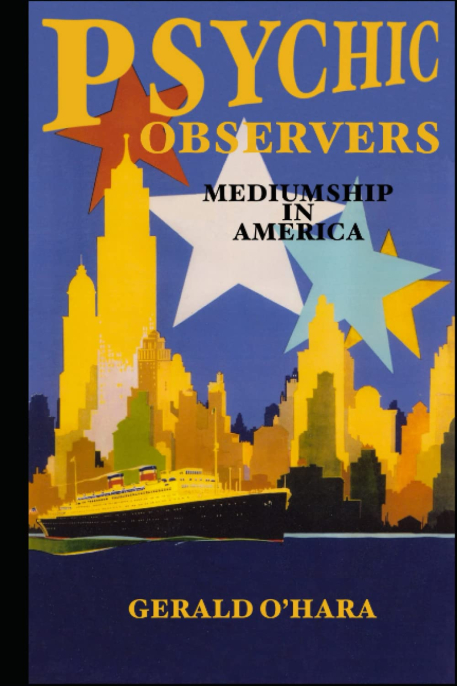
Reviewed by Brian C. Wilson
Gerald O’Hara’s Psychic Observers, third in his series, Mediumship in America, charts the rise and fall of the Psychic Observer, an American Spiritualist newspaper published from 1938 to 1961. Along the way, O’Hara discusses a number of issues that illuminate the wider history of American Spiritualism in the first half of the 20th century. These include the star system operating among American mediums; the often-rancorous politics behind the scenes at older established Spiritualist camps; the relations between American Spiritualists and those in the UK; and the ambiguous role the Spiritualist press played in both promoting and policing the Spiritualist movement.
The Psychic Observer was the brainchild of Ralph and Juliette Pressing. It was originally published at the Lily Dale Assembly, a long-established Spiritualist camp located in Upstate New York. Ralph Pressing had spent his childhood visiting the camp, and the first chapter contains an interesting description of the typical activities at Lily Dale during its summer season in the 1930s. In 1934, Ralph Pressing, who had experience as a journalist at a secular newspaper, launched the Dale News, a weekly newssheet that served as a program for the camp’s summer season. Soon, he was producing a similar sheet for Camp Cassadaga, Lily Dale’s sister institution in Florida that operated during the winter months. Given the success of these publications, and inspired by visits to the UK, where he met Maurice Barbanell, editor of the popular Psychic News, Pressing decided that there was a market for a national Spiritualist newspaper back in the US, especially one that mimicked the format of such pictorial weeklies as Life and the Saturday Evening Post. Happily, by this time Ralph had married Juliette Ewing Winkler, a “Kentucky divorcee” who “came with deep pockets” and who “was willing to invest in her new husband’s vision of a new National Spiritualist Newspaper” (p. 71). A year later, the first issue of the Psychic Observer rolled off the presses.
During its quarter-century of publication, the Psychic Observer covered all manner of stories relating to the Spiritualist movement, although it specialized in bringing to the public new mediums whom the Pressings found worthy. It also highlighted the programs of the various camp meetings and conventions, promoted and sold Spiritualist books, reviewed movies with Spiritualist themes, and ran ads for churches and individuals offering various psychic services. It must be said that little of this reporting was critical, as the Pressings envisioned the paper primarily to be a booster for the Spiritualist movement. They also wished to avoid lawsuits from mediums if the Psychic Observer were to expose them as frauds. Also problematic was the fact that the Psychic Observer frequently reprinted articles from the UK Psychic News, sometimes without proper attribution, which permanently cooled the once-warm relationship between the Pressings and the Psychic News’ editor, Maurice Barbanell.
In addition to editing the paper at their Lily Dale headquarters, the Pressings also conducted their own séances in the building’s basement, which was fitted out for this purpose and included audio recording equipment for later broadcast via radio. Like many Spiritualists of the day, the Pressings were especially fascinated by mediumship that produced physical manifestations. However, in 1940 in response to several scandals involving fake mediums, the board at Lily Dale sought to ban physical mediumship, which eventually led to friction with the Pressings. After unsuccessfully challenging the board in court for control of the Lily Dale Assembly, the Pressings decided to move the Psychic Observer, first to Jamestown, New York, in 1949, and then to Camp Chesterfield, Indiana, in 1954. Here they found a congenial spirit in Mable Riffle, executive secretary and guiding force at this, the oldest surviving Spiritualist camp in the Midwest. The Pressings soon re-established their paper at Chesterfield in a ranch home large enough for them to also open a psychic bookshop.
Illness finally forced the Pressings to sell the Psychic Observer in 1957. The new owners, editor Agnes F. Ruether and business manager Edward J. Byrne moved the newspaper back to Jamestown, New York. Ruether decided to take a more aggressive stance towards fraudulent mediumship, running front-page articles detailing scandals in both the US and the UK. Unfortunately, this had a negative impact on circulation, for while individual subscribers were reportedly in favor of this kind of coverage, many Spiritualist churches were not, canceling their institutional subscriptions and ads to protest the harm they felt such bad press was doing to the Spiritualist movement. In 1959, Ruether sold the newspaper to a new editor, Tom O’Neil, who continued the policy of outing fake mediums. In fact, it was O’Neil along with psychical researcher Andrija Puharich who documented a fraudulent séance conducted by Mable Riffle at Camp Chesterfield in June, 1960. According to O’Hara, when this became front-page news in the July, 1960 edition of the Psychic Observer, even more institutional support was lost, and the paper only managed to limp along for a year before publication ceased due to financial failure. Attempts were made subsequently to revive the publication, which eventually resulted in its merger in 1974 with Chimes magazine, the only other national Spiritualist periodical in the US. The Psychic Observer and Chimes Magazine lasted until 1981.
Having reviewed another of the Gerald O’Hara’s books, Ethel Post Parrish, I have to reiterate that while I enjoyed Psychic Observers, the same criticisms apply to it as to the earlier volume. This book’s narrative is convoluted to the point of being confusing, especially since the author jumps around chronologically in ways that can the leave the reader scratching his or her head. What’s more, Psychic Observers is filled with myriad problems of grammar, punctuation, and format, and I would ask the author to please employ a professional proofreader in future efforts. O’Hara has done some excellent original research in this book and has assembled some really interesting and detailed data about the American Spiritualist movement. It would be a shame if Psychic Observers were neglected simply because of the careless way that it has been self-published.
Brian C. Wilson is professor of American religious history in the Department of Comparative Religion at Western Michigan University.
This review first appeared in the Journal of the Society for Psychical Research, volume 87(3).

